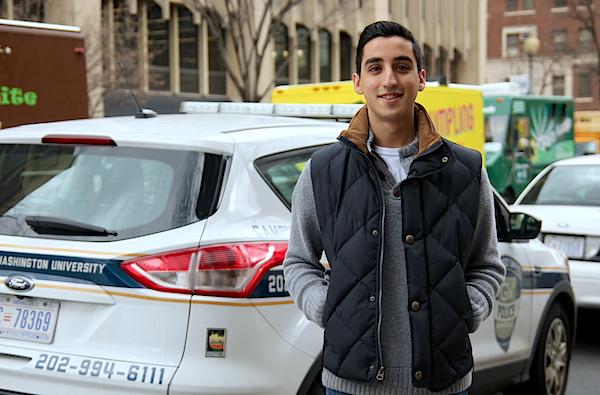A student leader thinks students can improve the University Police Department.
Thomas Falcigno, who was named the Student Association’s interim executive vice president earlier this month, said he wants to create a student task force to relay student concerns to UPD Chief RaShall Brackney and suggest improvements for the department.
Five of GW’s 14 peer institutions already have an organized way for students to express their concerns to their campus police departments through meetings and residence hall liaisons, but only two other universities have a police advisory board that includes students.
He said he has not yet reached out to Brackney, but plans to contact her by the end of the month.
Falcigno said the task force would work both ways, giving Brackney a chance to run potential new UPD policies by students to get their reactions before the rules are enforced.
“I think it would provide her a lot of information of how to go about policing in the future,” Falcigno said. “From what I hear, she is very open to student input and concerns.”
Brackney said though Falcigno had not yet approached her about his idea, she has had positive experiences working with SA president Andie Dowd and the former Executive Vice President Casey Syron.
She said in an email she looks forward to “learning more about the Student Association’s ideas and suggestions about safety and security on campus.”
Brackney, who arrived at GW last summer, said in the past that her goals include building personal relationships between UPD and the University community. She hosts small monthly gatherings where members of the GW community meet with her over coffee and discuss their concerns and goals for the department.
Peer school Georgetown University has a similar task force made up of students from different parts of their campus. The students in the university’s Student Safety Advisory Board meet twice a month to provide input on “safety and security issues that are trending with students,” according to a flyer for the program. Georgetown’s police department also consults these students when considering new policies, the flyer reads.
Northwestern University’s campus police department includes administrators and students from various students organizations, including student government representatives and members of the university’s Muslim Cultural Students Association.
Falcigno, a junior, said he has noticed a lack of communication between students and UPD since his freshman year and thinks the task force would help improve their interactions. He said he plans on researching how other schools work with their police forces.
“When I read the day-to-day duties of a UPD officer and the chief, there is a lot more than we, the students, don’t think about. It’s not just responding to residence halls and patrolling,” Falcigno said.
Dowd said she supported a student-led task force, though she said she hasn’t heard the details of Falcigno’s idea yet.
“I think having students is essential in this process,” Dowd said. “Unless we meet with the necessary people in this, then we are not doing our job.”
Samantha Nolan, a member the Chief of Police’s Citizen Advisory Council for the Metropolitan Police Department, said the student task force could be a helpful tool for getting insights from the diverse groups of students on campus. The student task force would have a similar purpose to the MPD advisory board: to inform the chief of concerns about policing.
Nolan said the student task force should also look at crime trends and suggest topics that the police should focus on more. She said community members can notice small things police officers may miss, like when a streetlight is out.
“The best thing to do would be to have a monthly meeting with the police chief and the officers and discuss issues on the campus, and how you think the police can help with problems,” Nolan said.
Robin Eberhardt contributed reporting.







